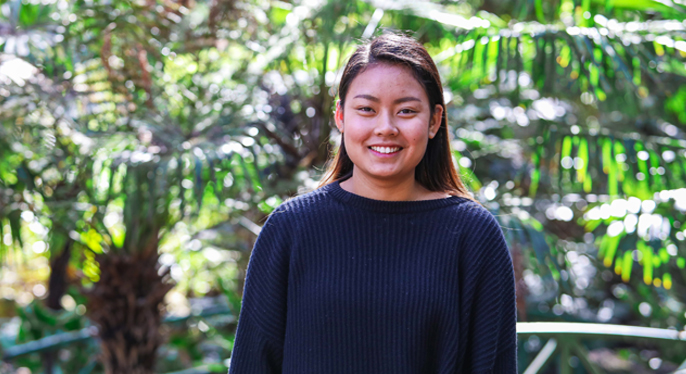When BSSC Year 12 student, Paw Bleh Htoo, was eight years old her family left the only home she had ever known, in the Noh Poe refugee camp on the Thai-Myanmar border, and arrived in Darwin to start a new life in Australia.
Amidst the sadness of leaving everything familiar, including members of her extended family and friends, her first impressions were of Darwin’s intense heat and humidity.
“I didn’t know how to turn the water tap on,” Paw Bleh laughs as she recalls being confounded by something so simple. “I’d never seen such a thing, and I couldn’t believe we could just drink the water that came out of it—we always boiled our drinking water.
“The other thing that really hit me was that the food didn’t taste like home. It was as though someone had tried to copy our food and it just didn’t work.”
Paw Bleh was also surprised by how many cars there were and how fast everyone drove.
Despite the constant presence of guards and the difficulties of life in a refugee camp, kids at Noh Poe knew how to have fun.
There were hardly any cars in the camp and they always drove so slowly that she and her friends could run after them, jump on, cling to the car for a short ride, and then jump off and walk back.
“Everyone knew everyone,” she says. “We had a river to swim in, there were waterfalls, beautiful forests, gardens. Not initially knowing the bigger picture of why we lived there, or any other life, I just did what kids do: I had fun.
“And I missed my friends so much when we came to Australia.”
Paw Bleh’s mother is clearly something of a visionary. Despite all she had endured, she was determined to give her family the best chance of a healthy and stable life—an attitude she has continued in Australia. In Noh Poe she began a business selling food, fruit, drinks—whatever she was able to access—and consequently the family was able to eat healthy food and afford some luxuries.
Paw Bleh’s parents grew up in Myanmar, but she was born after they had fled across the border and moved into the camp. Her mum has shared with her some of the ‘bad stuff’ that occurred and Paw Bleh describes these things as ‘unbelievable’.
“I would have hated to have been in Myanmar when my parents were there,” she says. “I was so lucky not to experience war. My mum worries about our family who are still in Myanmar. So far they are okay.”
Ten months after the family arrived in Darwin they moved to Bendigo where they had other friends. These early years were a time of major adjustment for everyone. But Paw Bleh remembers Miss Perry, her netball coach as a particular hero.
“She was so good to me when we first came here.”
Although Paw Bleh had begun learning English in Thailand, she now began to pick it up much more rapidly. She was already fluent in Karen and Thai. Now she added English to her repertoire.
In Year 8 at Weeroona College, Paw Bleh began studying Mandarin—her fourth language.
“It was a big class to start with, but by Years 9 and 10 a lot of students had dropped out,” she says.
Paw Bleh also dived into many other opportunities that presented themselves. In Year 8 she began violin and played in the combined schools orchestra—which was judged ‘gold standard’ when she was in Year 10. She also played netball and sang with the Weeroona College choir. Outside of school, she joined the Australian Defence Force Cadets.
It was also while she was at Weeroona College that Paw Bleh visited China on an eleven-day student exchange program.
“I just loved it,” she says. “We visited the Great Wall which was amazing. And I love Chinese food—especially bun and dumplings. I was also impressed with how calm the Chinese people were in the cities which are so busy.”
The trip was the start of something BIG (but more about that later).
“Coming to BSSC, I was like, ‘yes, no uniform!” Paw Bleh laughs. “When I got here what I really enjoyed was the freedom.”
However, one of the most important lessons Paw Bleh learnt early on at BSSC was that this freedom was not the freedom to slack off, but the freedom to develop your own approach and manage your commitments in your own best way. Outcomes depended on her.
“Initially I did everything at the last minute,” she recalls, “and that’s not a good thing. You don’t remember what you’re learning. And then I used to blame my teachers for giving me too much homework.
“The real problem was, I wasn’t doing it!
“I’ve worked out that if you just keep going, if you do something every evening —even if it’s not much—and never have more than a day or two completely away from the books, it’s actually quite manageable. It’s about creating a habit.”
If she could go back and give her younger self some advice, Paw Bleh would tell her to try everything, get involved and, most of all, do your homework!
Now, drawing towards the end of Year 12, Paw Bleh has given up most of her extra-curricular activities other than her part-time job. She is benefitting from her well-practiced attitude to study and has made decisions that will contribute positively towards her future plans.
Her intention is to work as an airline attendant for a major airline—a goal she has had since Year 7. It’s not a job she envisages doing for her whole working life; at some point she’d love to go to university, study business, and establish her own company.
“One day I want to be the CEO of my own company,” she says.
Paw Bleh’s immediate plans for 2020 were given a big shake up a few weeks ago when she received some incredible news.
“I’d applied for a scholarship to study in China next year as I’ve been learning Mandarin for four years and being fluent in the language will be a real advantage when I am applying to get into flight attendant training.”
To her delight Paw Bleh, along with three other BSSC students, was awarded one of the coveted scholarships.
(You can read more about the BSSC students awarded this scholarship in eNews: http://www.bssc.edu.au/news/shanghai-beckons-for-scholarship-recipients/)
From February next year, she will be attending Shanghai Normal University and sharing accommodation with a Chinese student.
“She will probably speak better English than me!” Paw Bleh says with a laugh.
“I’m so excited, but also nervous about my language level. I can start a conversation, but can’t continue it for long. Older people are usually very patient but kids sometimes laugh at me.”
Paw Bleh has already lived a significant time in two very different cultures, so we were keen to hear her perspective on world issues.
“What I am noticing in that everyone seems to want everything, but no one wants to share,” she says with sadness. “In Myanmar this has had terrible consequences.”
Paw Bleh believes the solutions is about compromise.
“In Myanmar, for example, the war is not necessary,” she says. “Perhaps if the Karen people gave Myanmar the land, but were allowed to keep their culture alive, that would be one way forward?”











